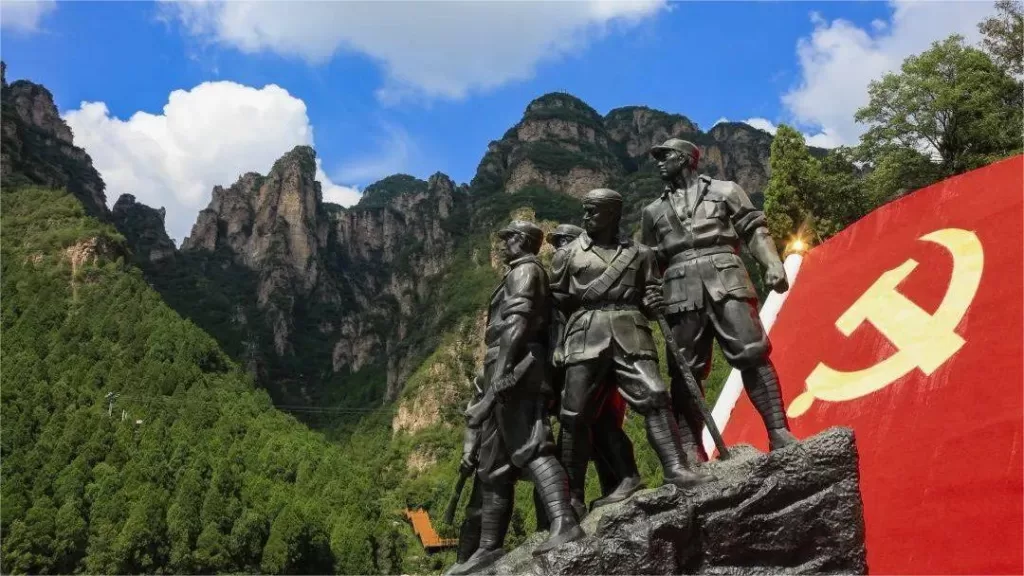琅琊山五壮士


The Langya Mountain Five Heroes (狼牙山五壮士) were a group of dedicated individuals who displayed exceptional courage and unwavering patriotism during a critical time in Chinese history. Comprising of five remarkable individuals, including the brave leader, these heroes played a crucial role in resisting Japanese aggression in the early 1940s. Their acts of heroism are eternally remembered as a symbol of national pride and unwavering commitment to the cause.
The story begins in August 1941 when the Japanese military forces in North China amassed more than 70,000 troops for a devastating campaign called the “Great Sweep” against the Shanxi-Chahar-Hebei Border Region, which included the Langya Mountain area. On September 25th of the same year, approximately 3,500 Japanese and puppet troops besieged the Langya Mountain region in the southwest of Yixian County, with the intent to eliminate the Eighth Route Army and local party and government agencies.
It was at this crucial moment that the Langya Mountain Five Heroes emerged. The heroes consisted of:
- Ma Baoyu (马宝玉) – The squad leader of the 6th Platoon, 7th Company, 1st Battalion, 1st Regiment of the 1st Division of the Jin-Cha-Ji Military Region, a dedicated Communist Party member.
- Ge Zhenlin (葛振林) – The deputy squad leader, also a committed Communist Party member.
- Song Xueyi (宋学义) – A valiant soldier.
- Hu Delin (胡德林) – Another courageous soldier.
- Hu Fucai (胡福才)- The fifth hero, who joined their ranks in this perilous battle.
The Seventh Company received orders to protect the party and government agencies, as well as facilitate the evacuation of troops and civilians. When it came time to retreat, Ma Baoyu and the other four heroes volunteered to stay behind as a rear guard, valiantly repelling repeated Japanese and puppet troop assaults, inflicting heavy casualties and injuries on the enemy.
The following day, in an effort to divert the Japanese forces from the main evacuation route, they retreated while continuing to engage the enemy in battle. Their determination led the Japanese to believe that they had cornered the main force of the Eighth Route Army.
In the face of the relentless advance of the Japanese and puppet forces, these five heroes chose a path of unparalleled bravery. When their ammunition was depleted, they resorted to using stones as weapons, unflinchingly fighting until the sun set. As the enemy closed in, they chose to take their own lives rather than surrender, destroying their weapons and leaping from a cliff, with Ma Baoyu, Hu Delin, and Hu Fucai making the ultimate sacrifice, while Ge Zhenlin and Song Xueyi managed to escape with the help of tree branches.
The heroic actions of these five individuals epitomized the spirit of patriotism, revolutionary heroism, and unwavering national pride. They were hailed as the “Langya Mountain Five Heroes” by the people. In recognition of their valor, the Jin-Cha-Ji Military Region leadership conferred the title of “Model Honorary Warrior” upon three of the martyrs. Ge Zhenlin and Song Xueyi received commendations and the “Bravery and Tenacity” medal.
In honor of these five anti-Japanese heroes, the local revolutionary government constructed the “Langya Mountain Three Martyrs Monument” at the peak of Chessboard Tuofeng, which was later rebuilt in May 1959 and renamed the “Langya Mountain Five Heroes Memorial Tower.” This monument stands as a symbol of their indomitable spirit and sacrifice for the nation, reminding future generations of the extraordinary courage displayed by these five heroes in the face of overwhelming adversity.